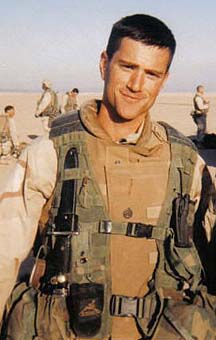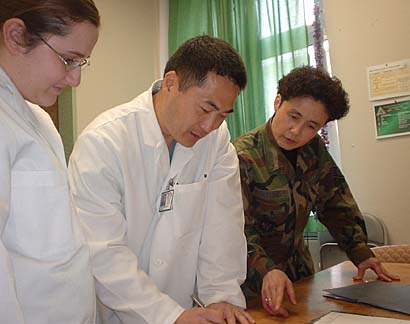
THE WAR IN IRAQIn the kill zone, a ‘pop’
and a spurt of blood
"Shrapnel from an RPG hit my left arm. Later, an AK-47 round pierced my hamstring."
Lying in his bed at the Landstuhl Army hospital in Germany, Staff Sgt. Adam Walker was restless about the platoon he'd left behind in Iraq. While the world obsesses about the outrages of a few MPs, Walker and other military personnel and their allies are trying to ensure liberty in Iraq. But nobody wants to hear their stories.
Staff Sgt. Adam Walker was wounded last month during fighting in Husaybah, Iraq.
Walker, 28, joined the Marines as a junior in high school in Henderson, N.C. Two years later, after graduation, he headed to Parris Island boot camp, well on his way to becoming a career Marine -- a 30-year Marine.
Walker and several other 3/7 (Third Battalion Seventh) Marines were hit recently during an attack in Husaybah, Iraq. Five of them died that evening. Without communications, the survivors kept fighting until medical help reached them. The injured were medivacked to Anaconda, the U.S. base north of Baghdad.
Walker called his surprised wife, Cathy, and told her, "The Marines will call soon to tell you I've been shot. I'm OK and should be well soon. I need to get back with my unit."
I spoke with Walker while he was recuperating.
P.T. Brent: Adam, tell us about the night you were hit.
Adam Walker: On the night of Saturday, 17 April, we sent our company out into the city of Husaybah to reinforce another unit, which had been ambushed. We're posted up in Al Q'iam on the Syrian border. Intel had reported that 300 to 500 fighters had entered the city from Fallujah. They had put word out for the people to stay out of the streets, as a battle was coming; so we brought it to them.
We dismounted two platoons on line; one was held back (to reinforce whoever needed it). I am a platoon sergeant for a 36-man platoon, comprised of three 10-man squads. I traveled with the southernmost squad on the far left flank.
The squad leader was a 21-year-old lance corporal, Danny Santos. As we began pushing into the city, I had Santos split the squad to cover more area and to present less of a target. We were a block apart, and would visually link up at each corner. We had moved about three blocks into the city when the team I was with came under fire. An RPG (rocket propelled grenade) flew past my head. A piece of debris from it made a slight cut on my right cheek. As the blood started to trickle down my face I had the strangest thought: "OK, I've been bloodied, it's out of the way, nothing can happen to me now." I don't know why I would think such a thing, but I grew more confident.
PTB: Did you seek medical aid?
AW: No, we took cover and no one was hurt. I crept up to peek around the corner and spotted an insurgent firing from a second-story window. As I stepped out and began firing in the window, something "popped" in front of me. I didn't know what it was, but everyone said it was an RPG. Small-arms fire continued to buzz around our heads. I looked down and my left arm fell sort of limp.
My sleeve was soon soaked red. I could see blood squirting out. A hole was put in my magazine, the cap was blown off my canteen and something entered my gear, blowing through my magazine pouch and finally lodging in the second magazine. It then burst into flames.
PTB: Where did it hit you?
AW: It was all on my left hip. As I looked down at the small blaze, I didn't know what to do. Stop, drop and roll like we were taught in elementary school, take the gear off -- no way! Not with the armored plates in! A novel idea entered my head: "Get out of the kill zone!"
I turned around to run back toward cover, when something smacked into the back of my right leg. So I thought, "Run faster!" As I rounded the corner I heard "Grenade!"
An enemy had thrown a grenade. It rolled under a fuel truck. Thank God it didn't go off.
PTB: Did you take cover??
AW: I remember thinking as I kept moving, looking under the truck at the grenade, "Nowhere is safe." Someone called a corpsman. A Doc (Navy corpsman) came up with Sgt. Good. Doc began cutting my sleeve off and applying a compression bandage, very calm and cool.
Meanwhile, (Lance Cpl. Danny) Santos with the other team began to flank the enemy. I heard "Corpsman up! We've got two more WIAs!" A cold feeling swept through me as I thought about one of my guys being hurt. I told Doc to go!
Santos had taken shrapnel in the stomach and the shoulder. He still took up an AT4 and eliminated a machine gun position after he was hit.
No one had seen Sosa go down just around the corner, with shrapnel going into his hip, then blowing out a large section of his buttocks. As Sosa lay there somewhat dazed, he looked up and saw four insurgents peeking over the wall above him. They thought he was dead. He heard Santos calling for him, and the enemy ducked behind the wall. Sosa could hear them reloading as Santos peeked around the corner.
Sosa gave his squad leader the "shhh" sign and pointed over the wall. Santos, with shrapnel in his abdomen and shoulder, dragged Sosa to cover. That's when he cried out, "Corpsman up! We've got two more WIAs!!"
This is when I began to audibly say, "Lord Jesus, help us through this fight."
PTB: Was it still daylight?
AW: Nightfall was approaching. We were static maybe an hour and a half, two hours. The company gunny came up with an aid and litter team. We put Sosa on a stretcher. Santos, myself, along with the rest of the squad, bounded back to the starting point, rifles at the ready.
Behind cover, Santos, Sosa and I gave our remaining ammo, water and any other essential gear to the remainder of the squad. I tasked Lance Cpl. Stamper with taking over the squad. I was coaching the Marines, giving orders and encouragement. Looming within me was this heavy burden that I was being medivacked while my Marines stayed in the fight.
PTB: How were you evacuated?
AW: I got in the Hummer and was driven to the nearby soccer field, the makeshift LZ (helicopter landing zone). It was then that tears began to well up in my eyes. Leaving the company was the hardest thing I've ever had to do.
We were helo'ed back to BAS. They cut off my uniform. Shrapnel from the RPG had entered my left arm, low on the bicep, just above the elbow. A small piece of shrapnel peppered my left thigh. An AK round had entered my right hamstring, making a clear exit wound, touching no bones, tendons, nerves or anything but leaving two holes a little larger than quarters. We then began a long, sedated medivac journey to an army field hospital outside of Baghdad, then to Kuwait and on to Germany.
PTB: Now that you are home, how do you feel?
AW: Guilt for being home while 3/7 is still in zone. Knowing I'm just a few doors down the street from Capt. Gannon's wife and four kids. He died the night I got hit. Happy to be with my wife and kids, especially the fact that I may now make the birth of our third in July, but guilty for feeling happy.
I replay ... in my mind what happened. What could I have done to fight and lead better?
I am proud of my Marines for their performance. I've recommended Santos for a Bronze Star. I think about my platoon; I believe so deeply that they need me there. I think about my brothers. I pray for them every day, and ask that you do the same.
BACK TO TOP |
Hilo surgeon Peter Matsuura, flanked by staffers, looks over patients' reports in the Army hospital in Landstuhl, Germany.
A Hilo surgeon repairs
bodies broken by war
LANDSTUHL, Germany >> "These boys arrive here hurt -- hurt bad," Lt. Col. Peter Matsuura tells a visitor to the Army hospital in Landstuhl, Germany. "Some have lost arms, legs, fingers -- and they have gone through hell. Most are only 18 to 20 years old."
Matsuura, a Hilo physician and son of the late state Sen. Richard Matsuura, is serving his country as a National Guard surgeon at the Army hospital here. The world is focused on the Iraq war combat deaths, but there are about six wounded for every soldier killed in combat.
The new flak jackets and helmets are preventing many deaths, allowing more Americans to survive, but often with debilitating limb injuries. As we mourn our war dead, let us also remember the many wounded we are sending home.
The hours of surgery for Matsuura and his colleague, Col. Hugh Harris, ran nearly 'round the clock when Marines injured in Fallujah were coming in by the score. While the pace has let up since then, the Army hospital at Landstuhl stays busy serving most of the coalition wounded from many countries.
(Among Matsuura's patients: Staff Sgt. Adam Walker and Lance Cpl. Danny Santos, the wounded Marines in the accompanying piece.)
Originally a school for Hitler Youth, the facility was converted by the Army into a medical center in 1953. Its record is admirable: only five deaths out of 13,000 patients during the past 12 years, through Desert Storm, Kuwait, Afghanistan and today's Iraq war (which accounts for more than 11,000 of the wounded). Thirty-one percent of Landstuhl's patients have been returned to duty.
Matsuura speaks long about how brave and patient these young American soldiers are when faced with loss of limbs and long recovery times. He believes Landstuhl has the finest medical aids, superior perhaps even to devices back home, where he provides about 50 percent of the orthopedic surgery in Hilo.
After graduating from Hilo High, where he was on the swim team, Matsuura spent six years in medical school at the University of California-Davis and UC-Irvine. His wife, Wendy, runs the office and now keeps the home front secure with two boys, Danny, 7, and Andy, 9, who miss their dad. A doctor from the mainland temporarily keeps things going at Matsuura's Hilo office.
When asked how he felt about taking a financial loss to help the Iraq war effort, as well as the time away from his family and patients, Matsuura replied, "My father always said, 'It's about what is right; you've got to do what is right.' These WIA and KIA are serving their country in the prime of their lives; it is an honor to help them."

